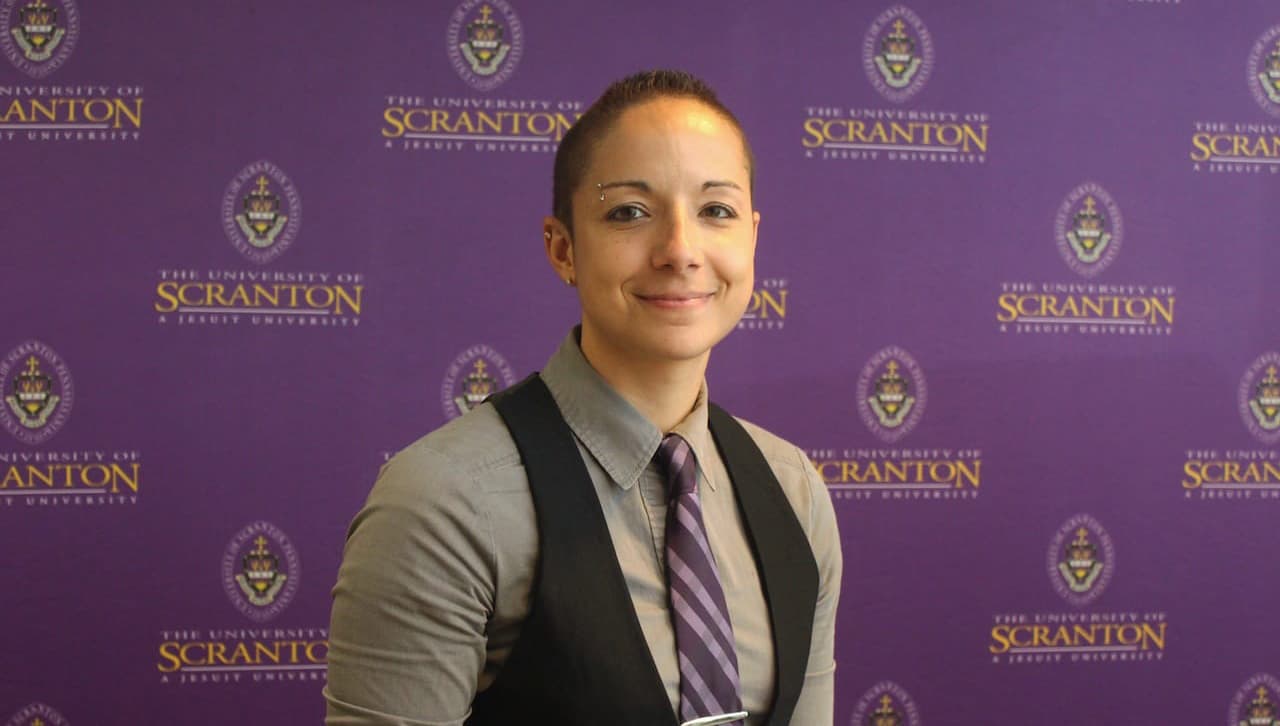Mid-semester Advice from Dr. Tadros

Billie Tadros, Ph.D., teaches poetry and first-year writing at The University of Scranton. She has completed bachelor’s degrees in creative writing and in music at Susquehanna University in Pennsylvania, a master’s degree in writing at Sarah Lawrence College in New York, and a doctoral degree in English and creative writing at the University of Louisiana at Lafayette. She previously taught at universities in Alabama and Louisiana. This is Dr. Tadros’s first year teaching at Scranton.
We asked Dr. Tadros for some advice on how to succeed at the mid-semester point.
What are some helpful tips to avoid a mid-semester slump?
Make sure you’re taking care of your body, not just your brain. Eat real food. Hydrate. Sleep. (Do as I say, not as I do.) And, as far as your brain goes, be sure you’re addressing your mental health—not just your grades. Take advantage of the resources available to you on campus, including the university’s Counseling Center, and recreational sports and the fitness center.
If you’re having a hard time motivating yourself, or if you’re stressed out, talk to your friends about it. Though people often present a façade that suggests they’ve totally got it together (especially on social media—some of y’all still use Facebook too, right?), the likelihood is that you’ve got friends who are stressed or struggling too. Sometimes just knowing you’re not alone in that can helpful, and what’s even better is when you’re able to support each other—maybe just by chatting and checking in, or maybe by having accountability study sessions where you sit together for two hours in the library or in DeNaples and work separately on what you need to get done in each other’s company.
Remember the things you love about this place—there’s so much to love! Take a break to take a walk through campus. Allow yourself to be present for your favorite class without spending the whole fifty minutes worrying about the next ten things you have to do. Go to a sporting event. Or, if you’ve got a lot of work to do, get a nice hot tea and go get some of that work done in your favorite quiet spot outside or in the library.
How can someone best pick up their grade in a class when the semester is already half over?
Every class is different, of course (pun intended!), as is every instructor, but I would encourage students to talk with their instructors about their concerns as early as possible (even if that is as far along in the semester as mid-term). I can only speak authoritatively for myself when I say this, but I’m much more inclined to consider extra credit opportunities, for example, when students come to me with their concerns and goals, when they take the initiative to start that conversation. More importantly, though, having a one-on-one conversation with your instructor allows him/her/them to offer you specific advice unique to you as an individual learner, something that instructors are rarely able to do during a regular class period in the classroom itself. (If you’re having trouble keeping up, or if you’re not sure why your study habits or your writing habits aren’t earning you the grades you want, a one-on-one conversation with your instructor might also yield helpful insights and new work strategies.)
The simple, unspecific advice I have if your grade is lower than you want it to be is this: do something differently. Maybe that means talking to your instructor. (I think it probably should mean this.) Maybe it means asking a friend who’s progressing comfortably in the course for study tips. Maybe it means changing the environment in which you complete course readings, write papers, or study for or complete exams. Maybe it means sleeping more. Maybe it means visiting the CTLE to work with a tutor, or visiting the Counseling Center to talk about outside pressures or stresses that may be influencing your work in your classes. But change something; be proactive.
Is there any other advice you think is important to pass on to students?
Do your best, of course—that’s what you want for yourself, and it’s what we, as your instructors, want for you. But recognize that you don’t have to be perfect. (Spoiler alert: none of us is perfect either, so it would be pretty unreasonable for us to expect for you to be.) You will not always perform as well as you hope you will—in class, on your assignments, in athletics or other extracurricular activities. And other times you will far exceed your own expectations. Both of those realities are OK. While the stakes are definitely high in college, you have plenty of opportunities to make up for the disappointing performances.
And remember that most problems have solutions, so when you find yourself struggling with one, take a deep breath and take advantage of all of the resources you’ve got here on campus to help you.
To read more tips from Dr. Tardros, visit the Campus Corner article, here.







